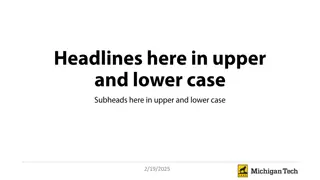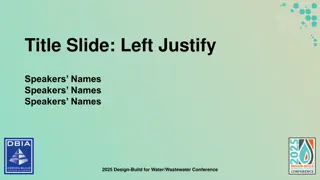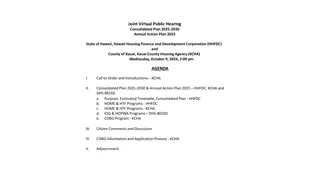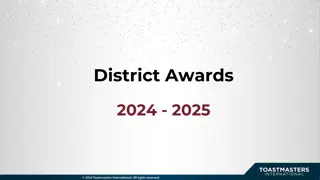
Understanding Comparative and Superlative Adjectives in English Language
Learn how to form and use comparative and superlative adjectives in English language to compare two or more things. Explore examples and irregular adjectives to enhance your language skills.
Download Presentation

Please find below an Image/Link to download the presentation.
The content on the website is provided AS IS for your information and personal use only. It may not be sold, licensed, or shared on other websites without obtaining consent from the author. If you encounter any issues during the download, it is possible that the publisher has removed the file from their server.
You are allowed to download the files provided on this website for personal or commercial use, subject to the condition that they are used lawfully. All files are the property of their respective owners.
The content on the website is provided AS IS for your information and personal use only. It may not be sold, licensed, or shared on other websites without obtaining consent from the author.
E N D
Presentation Transcript
Intelligent Medical Systems Department Intelligent Medical Systems Department Subject: English Language Subject: English Language Class: Third Class: Third Lecturer: MSC. Lecturer: MSC. Sakina Sakina Hussain Hussain Alsuwaydi Alsuwaydi Lecture: ( Lecture: ( 6 6) ) What s it like?, comparative and superlative adjectives. Study Year: 2024-2025
Whats It Like?, Comparative and Superlative Adjectives In English, we often use the question What s it like? to ask for a description of something. This question helps us understand the appearance, qualities, or characteristics of a person, place, or thing. Examples: -What s your new job like? (It s interesting and challenging.) -What s the weather like today? (It s cold and windy.)
Comparative and Superlative Adjectives 1. Comparative Adjectives 1. Comparative Adjectives (Used for Comparing Two Things) Comparative adjectives help us compare two people, places, or things. We usually add -er to short adjectives and use more before long adjectives.
Forming Comparatives: Forming Comparatives: Short adjectives: small smaller, fast faster, old older Adjectives ending in -y: happy happier, easy easier Long adjectives: expensive more expensive, beautiful more beautiful Examples: -This hospital is bigger than the old one. -Online learning is more effective than traditional classes.
2. Superlative Adjectives Superlative Adjectives (Used for Comparing Three or More Things) Superlative adjectives show the highest or lowest degree of a quality. We usually add -est to short adjectives and use most before long adjectives.
Forming Superlatives: Forming Superlatives: -Short adjectives: small smallest, fast fastest, old oldest -Adjectives ending in -y: happy happiest, easy easiest -Long adjectives: expensive most expensive, beautiful most beautiful Examples: -This is the best university in the country. -That was the most interesting lecture I ve ever attended.
Irregular Comparatives & Superlatives Some adjectives don t follow the regular rules: -Good better best -Bad worse worst -Far farther farthest
Summary: - What s it like? asks for descriptions. -Comparative adjectives compare two things (bigger, more expensive). -Superlative adjectives compare three or more things (biggest, most expensive). -Some adjectives have irregular forms (good better best).






















